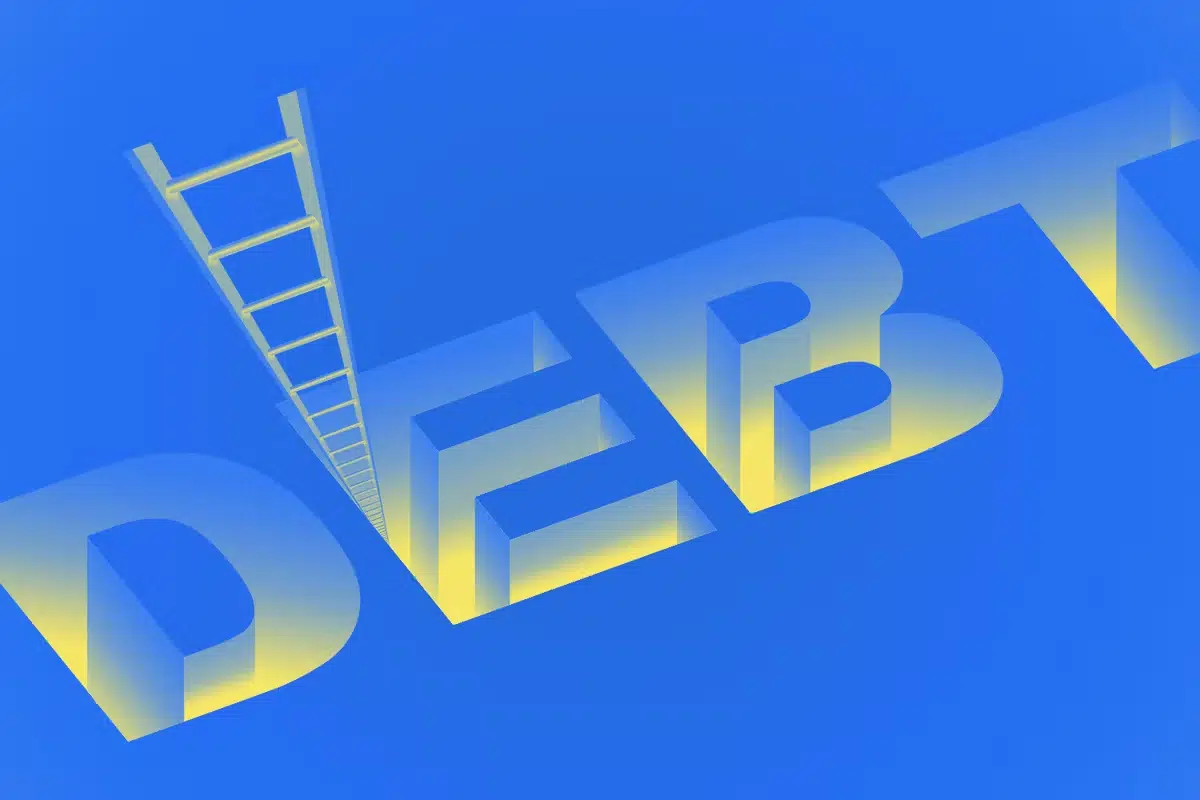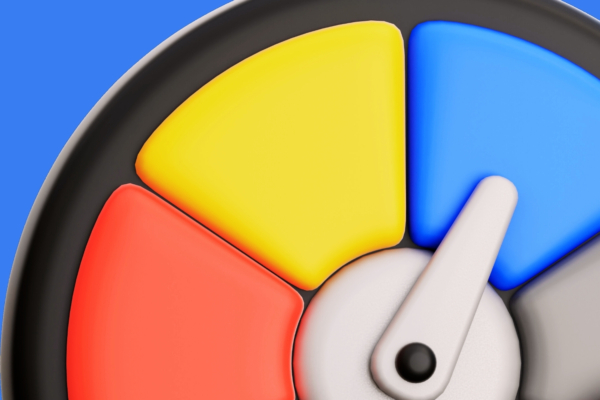
4 Ways to Get Out of Debt

Debt is a four-letter word for many—something to avoid mentioning, especially if you suffer under its weight. If you experience depression or anxiety because of your debt, just know that you’re not alone. In fact, one study found that over half of participants with student loans noted that their high debt load had led to depression, while 90% experienced anxiety.
Debt can have a negative impact on your mental health. It’s important for us to recognize that any time we have a conversation about debt and its impact. That awareness could be the start of your debt-free life!
Sound too good to be true? We’re not pretending it’s an overnight cure or a quick fix. It takes time and opportunity to learn the skills to help you cope with debt—skills that don’t necessarily come naturally. If you read this article and it’s too much right now, that’s ok. It will be here when you’re ready. Here are some skills you might find useful on your debt-free journey.
1. Face Up to Your Fear
The first step on your journey to being debt-free is to acknowledge the debt you have. Only by knowing what you’re up against can you formulate a plan to overcome your debt. Make a list of each credit card balance, student loan, personal loan, auto loan, etc., along with its accompanying interest rate. Once you have all your balances in front of you, take a deep breath. It might seem overwhelming to see your numbers in black and white, but give yourself a pat on the back. You’ve taken a huge first step toward paying off your debt.
2. Focus on What You Can Control
“Accept the things you cannot change and have the courage to change the things you can.” Easier said than done, right?
When it comes to getting out of debt, this might be a helpful attitude. You can’t go back in time and undo purchases you made on your credit cards. You can’t wish away the loans you took out. Your debt balance is yours, and it’s something you’ll have to deal with. Feeling shame or guilt for actions you took in the past might happen, but if you dwell on things you can’t change, it might be difficult to move forward.
Even though your debt might seem out of your control, there are certain things you can control, like how you treat money and how you use it. Feeling empowered by how you spend your money can help you see how money is—or isn’t—helping you.
Income, cost of living, the size of your family, health conditions and disabilities—there are some many factors that can go into this conversation. We can’t (and won’t) give blanket advice to anyone about how all of these tools should work for everyone—because they can’t. There are folks who can’t afford to cut a single dollar from their budget, and we recognize that.
With that in mind, take a look at this list and see if there’s anything you could change or add to your current financial picture.
Look at Current and Future Spending
The most direct way to cut debt is to cut spending and put that money towards paying off debt. If your budget is tight already, this might not be a useful tool for you.
If you think you can cut spending, start by looking at your spending over the year. It’s important to not judge yourself here, because what we’re really looking for is a pattern. What does your spending pattern say, and is it helpful to your goals? (Don’t have financial goals yet? Try this article!)
Here’s an example of a spending pattern:
Dan is very strict with his budget. He writes down everything spent every month, down to the penny. But towards the end of the month, if he sees he’s under budget, he’ll spend the next few days shopping online for things he wants. By the time the budget refreshes for the next month, he has overspent by a couple hundred dollars.
He has a few financial goals he’s working toward, including saving for retirement. He doesn’t feel like he’s making much progress.
Take the judgment out of any thoughts that come up here, and just look at it practically. Dan overspends by $200/month—he can afford it. By overspending on things he wants instead of needs, he’s shorting himself $2400 every year. If Dan is ok with that, there’s no problem. But if that number shocks Dan, he might take a look at the pattern and see what can be changed.
Change Your Interest Rates
It might seem that the interest rates on your debt are out of your control, but that’s not always the case. When it comes to lowering the interest rate on your debt, you have a few options:
- Balance transfer credit card. Some credit card companies offer an introductory offer of 0% interest when you transfer your balances to their card. You might consider taking advantage of this no interest credit card offer to lower your interest payments, but only if you can afford to pay off the debt before the introductory offer period ends. Otherwise, the interest rate will increase to the usual high percentage that credit cards usually offer.
- Home equity loan. If you own your home, another option to lower the interest rates on your debt is to take out a debt consolidation loan in the form of a home equity loan (HEL). If you pay off your high interest debt with a HEL, you can drastically reduce the amount you pay in interest over time as these generally have much lower interest rates than credit cards because they use your house as collateral. However, only take out a HEL if you can make the monthly payments—otherwise you could be risking your home.
Plan Your Income Boost
If you want to pay off your debt faster, one of the best ways to do so is to make more money. Consider taking on a side hustle to earn some extra cash. Even a few extra dollars every week can add up quickly. For example, $100 a week is an extra $5,200 per year—that could help you make a considerable dent in your debt.
Sometimes it’s more useful to look at this as a long-term strategy, rather than a short-term hustle.
- What are the skills and experiences you can add to your resume to make more money this time next year?
- Is there a different industry that would pay you more for the same work you’re doing now?
- If you’re at the top of your pay bracket at work, can you get a promotion in the next six months to a year?
If your long-term goal is to get out of debt and stay out of debt, increasing your income over the course of three years might be more useful to you. And in the best-case scenario, you can find a short-term hustle now that will give you the skills you need to get that promotion later.
Strategize Your Debt Payments
Finally, the way you pay off your debt can help motivate you to continue—and it’s all within your control! One of the most common strategies to maintain your momentum toward that debt free life is called the snowball method.
To follow this strategy, revisit the list of debts you made when facing up to your fear of debt. Identify the debt with the smallest balance, then focus any and all extra payments you’re able to make—either from extra income or savings gained from spending less—on this balance. Once you’ve paid off the smallest balance, congratulations! You’re one step closer to being debt free. To continue, choose the next smallest balance and put what you were paying toward the first account toward this one. Every time you pay off a balance, you’ll have more extra cash to put toward your next one, and you’ll be debt free faster than you think!
Is this the least expensive way to pay off debt? Technically no—you’d spend less on interest overall if you attacked the highest interest rate debt first. However—the snowball method works because it focuses on victories. Every time you pay off a loan or a card, you get the rush of being free from that debt, and then you snowball your efforts until the avalanche of debt is gone.
3. Imagine Your Debt-Free Future
While facing up to your fears and taking control of your payments are crucial steps toward getting out of debt, it’s easy to get discouraged during the debt payoff process. You might have to lose out on opportunities or go without something you really liked. To keep motivated, imagine your life when you’re debt-free.
- What are you looking forward to most?
- Will you have peace of mind?
- What experiences will you be able to enjoy without guilt?
- What will you be able to afford without anxiety?
Every time you doubt what you’re doing, take a look at these answers and remind yourself why you’re doing this. It’s not just about getting out of debt—it’s what comes after!
4. Be Kind to Yourself
Taking concrete steps toward paying off debt is important—but the mental aspect of debt repayment is just as important! Everyone’s different, and no one will have identical answers or strategies. The best way to get out of debt is the way that you can stick to, day by day, in pursuit of your long-term goals. Be kind to yourself as you make your way along your debt payoff journey, and give yourself room to change and grow as you go.


